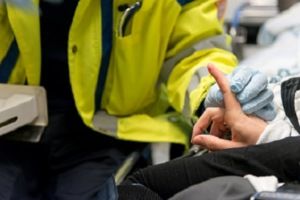News
Emergency hotline 1813 understaffed, experts charge
This article is more than 8 years old.
Problems with the medical hotline in the capital could be down to a lack of qualified personnel

There are worries that manning levels can lead to problems for patients calling 1813 (photo: Thomas Voss)
If you are seriously ill in the Copenhagen administrative region, Region Hovedstaden, and need urgent medical attention outside the hours that your GP is open, you can call the emergency hotline on 1813.
The hotline is staffed by doctors and nurses whose job it is to guide you with the correct help and assistance when your GP is closed.
However, the service has come under fire recently in the wake of a number of cases in which alarming symptoms have been overlooked, and incorrect or inadequate advice has been given, causing several deaths in the process.
READ ALSO: No doctor on call when deadly meningitis symptoms were reported to emergency line
Not enough staff
One of the reasons for the problems could be that there just aren’t enough staff on duty. The region has set norms for staffing levels that vary depending on whether it is a weekend, a weekday or what time of day it is.
However, a survey of the staffing rotas carried out by P4 København has shown that the hotline was undermanned according to the region’s own norms on 39 percent of the days in 2016 alone, DR Nyheder reports.
Kent Kristensen, an associate professor in medical law at the University of Southern Denmark, finds the figures worrying, as does Kjeld Møller Pedersen, a professor in health economics and health policy at the University of Southern Denmark.
“It is extremely unusual that you plan for understaffing when making the rota. The whole idea of planning is surely to make sure that there are enough people to do the job,” said Pedersen.
A spokesperson for the hotline explained to P4 København that typically staff are called in on a day-to-day basis when the management can see that the rota is under pressure. However, apart from one or two random checks, it has not been possible for the region to document how many people were in fact at work on any particular day.
Trouble with non-specialists
As well as having gaps in the rota, 1813 has also been criticised for employing doctors who are not specialists or doctors who are still undergoing training.
Since its start-up, there have been problems attracting enough staff to man the telephones and it has been necessary to employ plastic surgeons, psychiatrists and eye specialists to fill the rotas.
Trine Mottlau, the deputy head of pre-hospital treatment in Region Hovedstaden, doesn’t think there is a problem.
“If you look at our response times, you can see that we manage to get the job done.”
Mottlau also rejects the undermanning charges. “At the moment we have eight to ten vacant nursing posts that we are working hard to fill, but that’s not the same as having a rota that has gaps in it,” she said.
Regarding the latest two charges of serious mistakes being made in connection with young people with meningitis being misdiagnosed or incorrect treatment being given, Mottlau puts these down to human error and not organisational flaws in the hotline service.
“In these two cases, it was simply people not following the guidelines laid down for dealing with this kind of situation; in other words, human error,” she said.






































